 W
WThe Scout movement, also known as Scouting or the Scouts, is a voluntary non-political educational movement for young people. Although it requires an oath of allegiance to a nation's leaders and, in some countries, to a god, it otherwise allows membership without distinction of gender, race or origin in accordance with the principles of its founder, Lord Baden-Powell. The purpose of the Scout Movement is to contribute to the development of young people in achieving their full physical, intellectual, emotional, social and spiritual potentials as individuals, as responsible citizens and as members of their local, national and international communities. During the first half of the twentieth century, the movement grew to encompass three major age groups for boys: Cub Scout, Boy Scout and Rover Scout. In 1910, the Girl Guides was created, encompassing three major age groups for girls: Brownie Guide, Girl Guide and Girl Scout and Ranger Guide. It is one of several worldwide youth organizations.
 W
WNational Scouting and Guiding organisations are divided into different age groups in order to deliver the Scouting and Guiding programmes for a full range of youth.
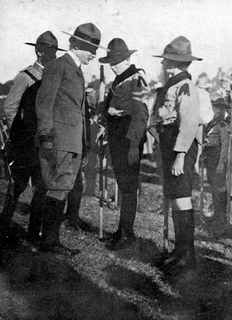 W
WBaden-Powell's Scout training scheme was a progressive series of tests for Boy Scouts, in skills which the founder of the Scout Movement believed would be useful in building character and good citizenship.
 W
WCub Scouts, Cubs or Wolf Cubs are programs associated with Scouting for young children usually between 7 and 12, depending on the national organization to which they belong. A participant in the program is called a Cub. A group of Cubs is called a 'Pack'.
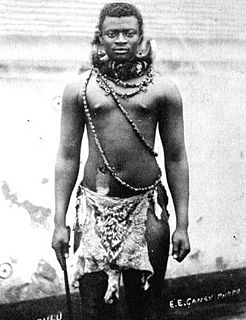 W
WDinuzulu kaCetshwayo was the king of the Zulu nation from 20 May 1884 until his death in 1913. He succeeded his father Cetshwayo, who was the last king of the Zulus to be officially recognized as such by the British. Zululand had been broken up into 13 smaller territories by the British after the Anglo-Zulu War, and Cetshwayo, and subsequently Dinuzulu, administered one of them. The British later realized the futility of breaking up Zululand into the territories and restored Cetshwayo as paramount leader of the territories. However, they left one of Cetshwayo's relatives, Usibepu (Zibhebhu), alone with his lands intact. On 22 July 1883, Usibepu attacked Cetshwayo's new kraal in Ulundi, wounding the king and causing him to flee.
 W
W"Ging Gang Gooli(-e)" or "Ging Gang Goo" is a gibberish song, widely spread around the world. It is popular among Scouts and Girl Guides.
 W
WGirl Guides is a movement found worldwide, which was originally and still largely designed for girls and women only. This organization was introduced in 1909, because girls demanded to take part in the then grassroots Boy Scout Movement.
 W
WThe Hackney Scout Song Book contains a collection of songs which were popular in the early days of the Scout Movement in the United Kingdom. Although originally intended for the use of Scouts in the Hackney district of East London, it quickly became the standard work of its type in the UK and around the world. First printed in December 1921, the last edition was published in 1972.
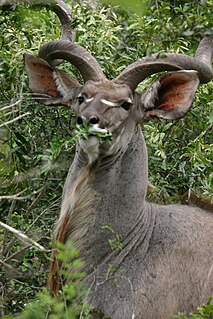 W
WThe kudus are two species of antelope of the genus Tragelaphus:Lesser kudu, Tragelaphus imberbis, of eastern Africa Greater kudu, Tragelaphus strepsiceros, of eastern and southern Africa
 W
WMany Scout Groups claim the title of oldest Scout Group in their respective countries. Due to the rapid growth of Scouting, it took some time for central organisations to be established, and the earliest groups were only registered some time after their first meeting. Some groups first met under the banner of other organisations, including the Boys' Brigade, Church Lads' Brigade, YMCA, churches or schools, and only later registered with central Scout organisations. Some maintained dual registrations. This makes it impossible to establish which groups started first. Today, national Scout associations often do not take a stance as to which was the first group in their country.
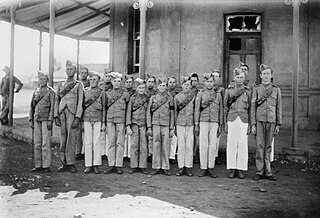 W
WThe Mafeking Cadet Corps was a group of boy cadets formed by Lord Edward Cecil shortly before the 217 day Siege of Mafeking in South Africa during the Second Boer War in 1899–1900. Cecil, the son of the British prime minister, was the staff officer and second-in-command of the garrison. The cadets consisted of volunteer boys below fighting age and were used to support the troops, carry messages, and help in the hospital. This freed up men for military duties, and kept the boys occupied.
 W
WPioneering is the art of using ropes and wooden spars joined by lashings and knots to create a structure. Pioneering can be used for constructing small items such as camp gadgets up to larger structures such as bridges and towers. These may be recreational, decorative, or functional.
 W
WReligion in Scouting and Guiding is an aspect of the Scout method that has been practiced differently and given different interpretations over the years.
 W
WRover Scouts, Rovers, Rover Scouting or Rovering is a Scouting program for adult men and women. A group of Rovers is called a 'Rover Crew'.
 W
WRovering to Success is a life-guide book for Rovers written and illustrated by Robert Baden-Powell and published in two editions from June 1922. It has a theme of paddling a canoe through life. The original edition and printings of second edition were subtitled "A Book of Life-Sport for Young Men" but this was changed to "A Guide for Young Manhood" in the later printings.
 W
WA Scout is a child, usually 10–18 years of age, participating in the worldwide Scouting movement. Because of the large age and development span, many Scouting associations have split this age group into a junior and a senior section. Scouts are organized into troops averaging 20–30 Scouts under the guidance of one or more Scout Leaders. Troops subdivide into patrols of about 6–8 Scouts and engage in outdoor and special interest activities. Troops may affiliate with local, national, and international organizations. Some national Scouting associations have special interest programs such as Air Scouts, Sea Scouts, outdoor high adventure, Scouting bands, and rider Scouts.
 W
WA Scout Group is a local organizational structure in some Scouting organizations that consists of different age programs, gender units and/or multiple units of the same age program.
 W
WA Scout leader or Scouter generally refers to the trained adult leader of a Scout unit. The terms used vary from country to country, over time, and with the type of unit.
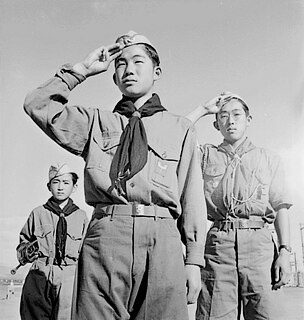 W
WThe Scout method is the informal educational system used by Scouts. The aim of Scouting is character training with the goal of helping participants become independent and helpful, and thereby become "healthy, happy, helpful citizens".
 W
WA Scout troop is a term adopted into use with Boy Scouts, Girl Scouts and the Scout Movement to describe their basic units. The term troop echoes a group of mounted scouts in the military or an expedition and follows the terms cavalry, mounted infantry and mounted police use for organizational units.
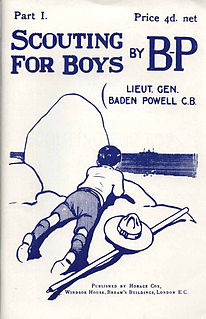 W
WScouting for Boys: A handbook for instruction in good citizenship is a book on Boy Scout training, published in various editions since 1908. Early editions were written and illustrated by Robert Baden-Powell with later editions being extensively rewritten by others. The book was originally a manual for self-instruction in observation, tracking and woodcraft skills as well as self-discipline and self-improvement, about the British Empire and duty as citizens with an eclectic mix of anecdotes and unabashed personal observations and recollections. It is pervaded by a degree of moral proselytizing and references to the author's own exploits. It is based on his boyhood experiences, his experience with the Mafeking Cadet Corps during the Second Boer War at the Siege of Mafeking, and on his experimental camp on Brownsea Island, England.
 W
WScouting memorabilia collecting is the hobby and study of preserving and cataloging Boy Scouting and Girl Guiding items for their historic, aesthetic and monetary value. Since collecting depends on the interests of the individual collector, the depth and breadth of each collection varies. Some collectors choose to focus on a specific subtopic within their area of general interest, for example insignia issued prior to the 1970s Boy Scouts of America requirement that all insignia have either the fleur-de-lis or the acronym BSA; or only the highest ranks issued by each nation. Others prefer to keep a more general collection, accumulating any or all Scouting merchandise, or Scouting stamps from around the world.
 W
WScouting 'Round the World is the seminal work on world Scouting, a publication of the World Organization of the Scout Movement, updated every three years, with details on all WOSM member-nation organizations. The equivalent publication of the World Association of Girl Guides and Girl Scouts is Trefoil 'Round the World.
 W
WScouting sex abuse cases are situations where youth involved in Scouting programs have been sexually abused by someone who is also involved in the Scouting program. In some instances, formal charges have been laid, resulting in specific legal cases.
 W
WScouts' Own or Guides' Own is an inspirational, informal ceremony held as part of Scouting or Guiding activities.
 W
WThe Second Matabele War, also known as the Matabeleland Rebellion or part of what is now known in Zimbabwe as the First Chimurenga, was fought between 1896 and 1897 in the region later known as Southern Rhodesia, now modern-day Zimbabwe. It pitted the British South Africa Company against the Matabele people, which led to conflict with the Shona people in the rest of Southern Rhodesia.
 W
WThe White Stag Leadership Development Program, founded in 1958, is a summer leadership training program for youth 10 1/2–18 led by two California-based non-profits that sponsor leadership development activities. The teen youth staff of the two programs develop and produce several week-long leadership summer training sessions every year for several hundred youth from Central and Northern California and a few youth from other states and countries. The outdoors program is based on hands-on learning methods to develop competencies.
 W
WThe Wolf Cub's Handbook is an instructional handbook on Wolf Cubs training, published in various editions since December 1916. Early editions were written and illustrated by Robert Baden-Powell with later editions being extensively rewritten by others. The book has a theme based on Rudyard Kipling's The Jungle Book jungle setting and characters.
 W
WThe World Friendship Fund is a major endowment fund of the Boy Scouts of America developed during the closing days of World War II, the answer of Scouting to the Marshall Plan, to rebuild Scouting in nations that had been wracked by war.